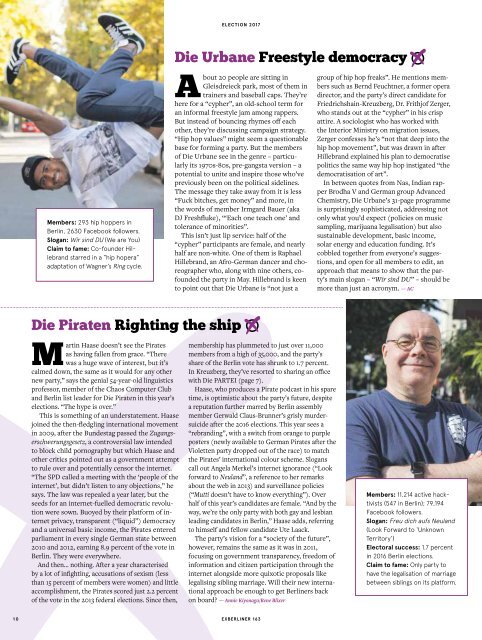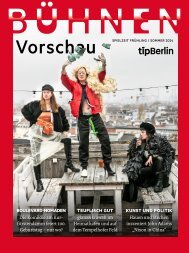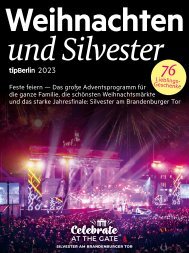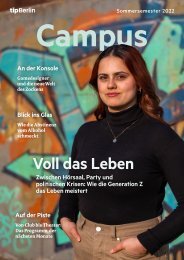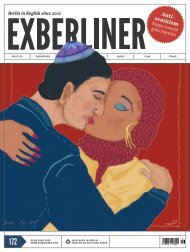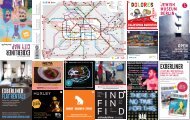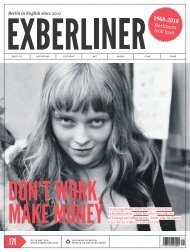EXBERLINER Issue 163, September 2017
Create successful ePaper yourself
Turn your PDF publications into a flip-book with our unique Google optimized e-Paper software.
ELECTION <strong>2017</strong><br />
Die Urbane Freestyle democracy<br />
Members: 293 hip hoppers in<br />
Berlin, 2630 Facebook followers.<br />
Slogan: Wir sind DU (We are You)<br />
Claim to fame: Co-founder Hillebrand<br />
starred in a “hip hopera”<br />
adaptation of Wagner’s Ring cycle.<br />
About 20 people are sitting in<br />
Gleisdreieck park, most of them in<br />
trainers and baseball caps. They’re<br />
here for a “cypher”, an old-school term for<br />
an informal freestyle jam among rappers.<br />
But instead of bouncing rhymes off each<br />
other, they’re discussing campaign strategy.<br />
“Hip hop values” might seem a questionable<br />
base for forming a party. But the members<br />
of Die Urbane see in the genre – particularly<br />
its 1970s-80s, pre-gangsta version – a<br />
potential to unite and inspire those who’ve<br />
previously been on the political sidelines.<br />
The message they take away from it is less<br />
“Fuck bitches, get money” and more, in<br />
the words of member Irmgard Bauer (aka<br />
DJ Freshfluke), “‘Each one teach one’ and<br />
tolerance of minorities”.<br />
This isn’t just lip service: half of the<br />
“cypher” participants are female, and nearly<br />
half are non-white. One of them is Raphael<br />
Hillebrand, an Afro-German dancer and choreographer<br />
who, along with nine others, cofounded<br />
the party in May. Hillebrand is keen<br />
to point out that Die Urbane is “not just a<br />
group of hip hop freaks”. He mentions members<br />
such as Bernd Feuchtner, a former opera<br />
director, and the party’s direct candidate for<br />
Friedrichshain-Kreuzberg, Dr. Frithjof Zerger,<br />
who stands out at the “cypher” in his crisp<br />
attire. A sociologist who has worked with<br />
the Interior Ministry on migration issues,<br />
Zerger confesses he’s “not that deep into the<br />
hip hop movement”, but was drawn in after<br />
Hillebrand explained his plan to democratise<br />
politics the same way hip hop instigated “the<br />
democratisation of art”.<br />
In between quotes from Nas, Indian rapper<br />
Brodha V and German group Advanced<br />
Chemistry, Die Urbane’s 31-page programme<br />
is surprisingly sophisticated, addressing not<br />
only what you’d expect (policies on music<br />
sampling, marijuana legalisation) but also<br />
sustainable development, basic income,<br />
solar energy and education funding. It’s<br />
cobbled together from everyone’s suggestions,<br />
and open for all members to edit, an<br />
approach that means to show that the party’s<br />
main slogan – “Wir sind DU” – should be<br />
more than just an acronym. — AC<br />
Die Piraten Righting the ship<br />
Martin Haase doesn’t see the Pirates<br />
as having fallen from grace. “There<br />
was a huge wave of interest, but it’s<br />
calmed down, the same as it would for any other<br />
new party,” says the genial 54-year-old linguistics<br />
professor, member of the Chaos Computer Club<br />
and Berlin list leader for Die Piraten in this year’s<br />
elections. “The hype is over.”<br />
This is something of an understatement. Haase<br />
joined the then-fledgling international movement<br />
in 2009, after the Bundestag passed the Zugangserschwerungsgesetz,<br />
a controversial law intended<br />
to block child pornography but which Haase and<br />
other critics pointed out as a government attempt<br />
to rule over and potentially censor the internet.<br />
“The SPD called a meeting with the ‘people of the<br />
internet’, but didn’t listen to any objections,” he<br />
says. The law was repealed a year later, but the<br />
seeds for an internet-fuelled democratic revolution<br />
were sown. Buoyed by their platform of internet<br />
privacy, transparent (“liquid”) democracy<br />
and a universal basic income, the Pirates entered<br />
parliament in every single German state between<br />
2010 and 2012, earning 8.9 percent of the vote in<br />
Berlin. They were everywhere.<br />
And then... nothing. After a year characterised<br />
by a lot of infighting, accusations of sexism (less<br />
than 15 percent of members were women) and little<br />
accomplishment, the Pirates scored just 2.2 percent<br />
of the vote in the 2013 federal elections. Since then,<br />
membership has plummeted to just over 11,000<br />
members from a high of 35,000, and the party’s<br />
share of the Berlin vote has shrunk to 1.7 percent.<br />
In Kreuzberg, they’ve resorted to sharing an office<br />
with Die PARTEI (page 7).<br />
Haase, who produces a Pirate podcast in his spare<br />
time, is optimistic about the party’s future, despite<br />
a reputation further marred by Berlin assembly<br />
member Gerwald Claus-Brunner’s grisly murdersuicide<br />
after the 2016 elections. This year sees a<br />
“rebranding”, with a switch from orange to purple<br />
posters (newly available to German Pirates after the<br />
Violetten party dropped out of the race) to match<br />
the Pirates’ international colour scheme. Slogans<br />
call out Angela Merkel’s internet ignorance (“Look<br />
forward to Neuland”, a reference to her remarks<br />
about the web in 2013) and surveillance policies<br />
(“Mutti doesn’t have to know everything”). Over<br />
half of this year’s candidates are female. “And by the<br />
way, we’re the only party with both gay and lesbian<br />
leading candidates in Berlin,” Haase adds, referring<br />
to himself and fellow candidate Ute Laack.<br />
The party’s vision for a “society of the future”,<br />
however, remains the same as it was in 2011,<br />
focusing on government transparency, freedom of<br />
information and citizen participation through the<br />
internet alongside more quixotic proposals like<br />
legalising sibling marriage. Will their new international<br />
approach be enough to get Berliners back<br />
on board? — Annie Kiyonaga/Rene Blixer<br />
Members: 11,214 active hacktivists<br />
(547 in Berlin); 79,194<br />
Facebook followers.<br />
Slogan: Freu dich aufs Neuland<br />
(Look Forward to ‘Unknown<br />
Territory’)<br />
Electoral success: 1.7 percent<br />
in 2016 Berlin elections.<br />
Claim to fame: Only party to<br />
have the legalisation of marriage<br />
between siblings on its platform.<br />
10<br />
<strong>EXBERLINER</strong> <strong>163</strong>


